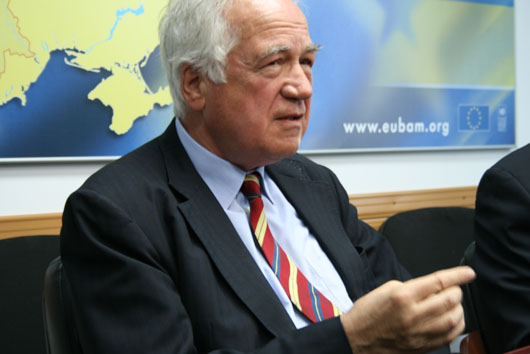Without Russia there is no solution for Transnistria (article from agence europe)
Chisinau, 19/03/2008 (EDD) – On the sidelines of discussions on enlargement, the NATO summit in Bucharest (2-4 April) may prove decisive for the future of Moldova and for moving towards a solution to the Transnistrian conflict.
President Vladimir Vorinin recently told the press he wanted strict neutrality for Moldova, comparable to that of Switzerland. In an interview with the Russian daily, Kommersant, Voronin stresses that Moldova’s neutrality is guaranteed by its Constitution, but he calls for this status to be “set out in a declaration stating that Moldova’s neutrality is recognised by all”. “This document should be signed by Moldova as a sovereign state as well as by Russia, Ukraine, the United States, the European Union and the Organisation for Security and Cooperation in Europe”, he explains. Interpreted as being in foresight of Russian blockage of the rapprochement between Moldova and NATO, the declaration may be signed on the sidelines of the summit. According to several diplomatic sources speaking to EDD in the context of a visit by MEPs to Ukraine and Moldova, organised by the Kangaroo Group, Russia would not consider a simple declaration of neutrality sufficient. The same sources point out that Moldova and the Transnistrian conflict are, for Russia, an asset in a broader international context: - NATO-Russia relations, the missile shield, NATO bases in Bulgaria and in Romania, Kosovo, the Caucasus and Central Asia, etc.
It is acknowledged that Moscow is seeking a stronger position on the international scene and is touchy about even the idea of losing a little of its influence in countries of its close neighbourhood. According to one diplomatic source, if it cannot maintain status quo, Russia will seek to maintain its troops in Moldova or to obtain a number of guarantees such as the presence in the Moldovan parliament of deputies from Transnistria. Russia, fearing for basic Russian federalism, considers the recognition of Transnistrian’s independence, like the self-proclaimed independence of Abkhazia and South Ossetia, is not to be taken into account.
President Voronin takes the view that reunification of Moldova would be the pinnacle of his political career (he cannot seek another presidential mandate in March 2009). The offer of neutrality, as well as the recent declarations whereby Moldova would leave the GUUAM (Georgia, Ukraine, Uzbekistan, Azerbaijan and Moldova), little appreciated in Moscow, are all signs that a compromise is being made with the large neighbour to the East. The 5+2 process (OSCE, Russia, Moldova, Ukraine, Transnistria plus EU and United States as observers) has been suspended since 2006 further to the boycott on the part of pseudo Transnistrian authorities following the introduction by Moldova of a single customs regime. This would authorise Transnistrian businesses to export their products on condition that they bear the Chisinau tax stamp. After a wave of protests and the blocking of borders, over 400 Transnistrian businesses signed up to this scheme, and now operate de facto like Moldovan businesses, including the largest exporters such as the steel company, Standard, which accounts for 70% of Transnistrian exports, and two other large companies, one in the energy sector and the other in the textile sector. Be this as it may, the negotiation process has not been resumed. According to one European diplomatic source, Transnistrian leaders are in fact not very cooperative, all the more as Russia also guarantees most of the economic activity of the breakaway region. Seeking to bring the parties back to the negotiating table, the EUSR for Moldova is organising periodic meetings with Russia, the authorities of the pseudo-state of Transnistria, Moldovans and Ukrainians, underlining that any solution should take into account Moldova’s territorial integrity, democratisation, an appropriate form of self-governance within Moldova and possible security agreements. Under no circumstances will the EU recognise an independent Transnistria.
